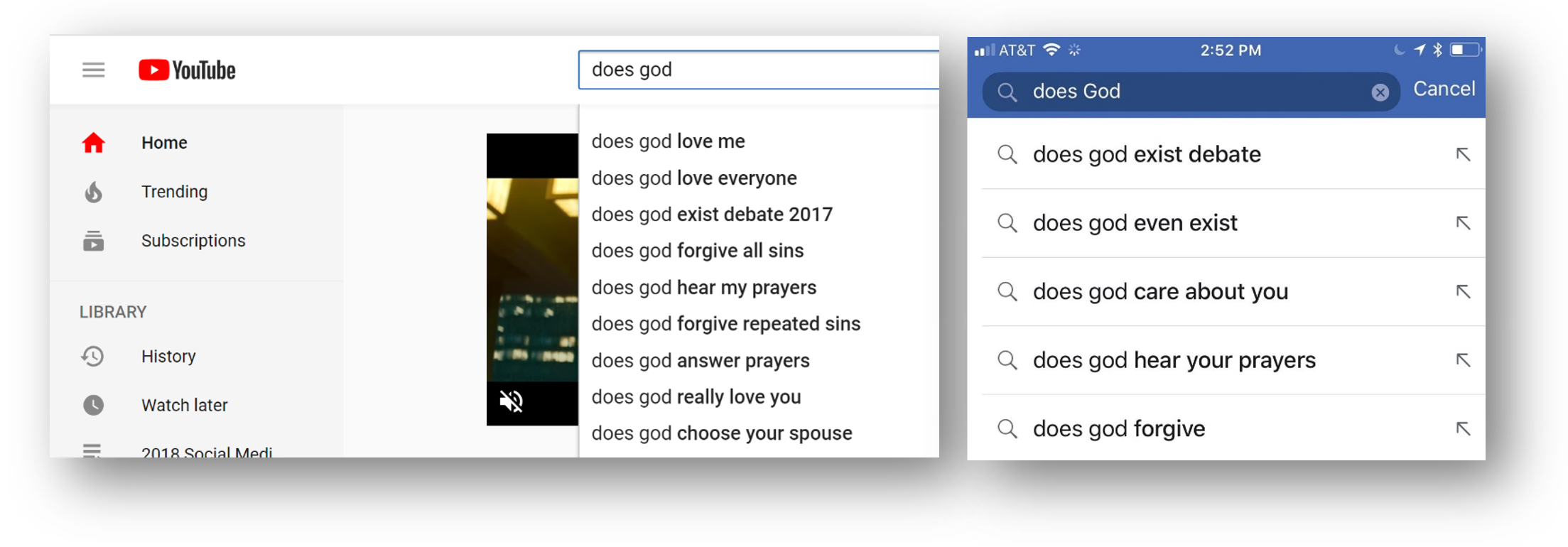Jamie Jean Schneider DommDigital Strategist, Social Media + Big Data, North American Division Social media is the ultimate equalizer. It gives a voice and a platform to anyone willing to engage. ―Amy Jo Martin Before we get started, we must first answer the question, “Who is a content creator?” The ultimate source of creative content and inspiration will always be the Bible and God. Therefore, those of us who answer the call to share the gospel online must always look first to Jesus Christ and His word for guidance. Social media and modern technologies have eased entry into the world of telling stories, sharing ideas, and expressing thoughts through creative visual content to a wide audience. We can all be writers, creatives, and publishers now. This means that when it comes to creating content for evangelism and discipleship, the role is no longer restricted to pastors, theologians, and other trained professionals. Church leaders can organize teams of content creators within their churches and ministries by empowering professionals or aspiring young people with expertise in design, video, communications, writing, technology, etc. Many congregations have yet to tap into the potential of tech savvy members and their modern-day spiritual gifts. Greater collaboration across multiple generations can be fostered by investing in young people and giving them space to utilize their skills in this area for the Church. Organize Your TeamThere’s no single way to organize your team(s), given that every ministry is unique. Start by taking an inventory of your church’s human resources and individuals’ personal interests and skills. Then organize accordingly to best accomplish your goals and utilize your church body’s strengths and talents. Determine roles and responsibilities, set up a multi-channel content calendar that can be shared with everyone on the team, and map out your content strategy, being sure to take an integrative approach that incorporates both traditional and digital methods of communication. Download a content calendar template (be sure to customize it to reflect your channels). We recommend using Google Docs for sharing the content planning calendar with your team. Remember the “Rule of 7”If you recall from the “Strong Foundations” section, the “Rule of 7” states that a person needs to be exposed to a message at least seven times before they’ll take a desired action. Develop a comprehensive content strategy that incorporates both traditional media and digital, working together to maximize impact. In most cases, digital media is not used in place of traditional forms of communication, but in addition, as a means of amplifying your message to a larger community. Implementing an effective content strategy requires repeated, consistent messaging from multiple communication channels. Plan to repackage your content for different platforms and channels. If we view evangelism holistically, every touchpoint matters, as your target audience is likely to come in contact with several. These touchpoints may include, but are not limited to:
The 20/80 RuleWhether you realize it or not, your communications and content (or lack thereof) are telling a story, and that story is key to giving your audience a sense of why your ministry is valuable. When your audience values what you’re doing, they are more likely to respond to your call-to-actions and actively participate in other ways. Social media is popular because it speaks to a basic human need: to connect and share. We must use digital media to tell our “story” all day, every day, and build a connection with our community that ultimately motivates them to draw closer to Christ. Along with the “Rule of 7,” you’ll want to incorporate the 20/80 principle in your content planning. The ideal ratio of posts on an organization’s digital media should be 20% direct appeals (calls-to-action to get involved, donate, register, etc.), 80% engagement. In other words, 80% of the content posted by your ministry should:
The same principle is true for an organization’s social media channels. If you spend most of your efforts telling the story behind your ministry and creating value, your followers will gradually become more emotionally invested. Then, when you make direct appeals for action (the 20%), you will have better results because your supporters feel like they understand the importance of your mission, know what to expect, and know how the money will be used. This is especially important for millennial givers, who demand transparency and accountability when it comes to use of funds. Plan EfficientlySocial media can seem daunting, but it doesn’t have to be. For most Adventist entities, social media manager is just one of many hats an employee or volunteer might wear. If you happen to be a full-time digital strategist, you’re likely managing multiple campaigns and projects at once. Regardless of your level of expertise, there never seems to be enough time in the day to accomplish everything you need to do in order to stay on top of the ever-growing evangelistic influence of digital media. Streamlining your approach will help you and your team tackle a large workload. Here are our top three tried-and-true time-saving tips for developing your content and/or campaign strategy:
Repurpose What You Already ProduceNo need to start from scratch; your team is probably already doing a good job generating content related to newsworthy events or outreach. Packaging it for the digital space and publishing online enables you to grow your potential audience exponentially beyond the worship service. A great amount of what your team may already produce for your local church ministries is content, for example: sermons and live-streams each week, studies for small groups, messages from the pastor in newsletters, videos, pictures from events, testimonials, etc. Always look for content you are already creating, then consider how it can be repackaged and weaved into your overall digital content strategy. This can be inexpensive and have long-term value as the content stays in place and is relevant for people to discover far into the future. Prioritize content that will help your audience in a tangible way, either emotionally, physically, spiritually, or psychologically. Finding Relevant Content Ideas For Your Target AudienceIf you’re like many content creators, you’ve hit a creative roadblock at some point. It doesn’t matter if you’re a pastor, Christian vlogger, or a digital disciple; we have all run out of content ideas and sat staring at our laptops at some point. As digital evangelists, we want to create relevant content, but may not always be sure what people are searching for online. Our purpose is to meet the needs of people in the digital space, and luckily, the inspiration we need lies in tools many of us use every day. Being strategic and intentional with the content we create, can help us provide people with the answers and connection they are searching for. I’ve said this before: people are literally Googling for God, and I don’t expect this to change anytime soon. Each year there are millions of Google searches for answers to questions like:
There is a great need for our message of hope and wholeness. Additionally, many people are hurting emotionally, entertaining suicidal thoughts, or feel there is no hope for their situation. They turn to the internet for companionship, understanding, information, anonymity, and more. It’s easier for them to pour out their heartfelt searching to Google or on social media than it is to talk to a friend, neighbor, co-worker, or family member. Consequently, this is where we, as disciples, need to cast our net. We need to provide the kind of spiritual food the fish are looking to feed on. Here is an easy tip for a wealth of content ideas: Find content, write content, and curate content related to top Google searches. Frame your posts to pique curiosity and answer people’s questions, addressing their deepest longings. You can get top search data from any search engine, YouTube, and other social media trend tracking sites. Try it. Start typing in a question and let the search engine auto-finish. The top results represent the most popular search queries. In other words, you will see what large numbers of people are searching for online. It gives you a sneak peek into their needs, worries, nagging questions, and often hidden yearnings. These trends allow us to predict what topics audiences may find interesting, and we can use this predictability to speak to the masses in a relevant way. When we make content that speaks to people’s spiritual needs and seeks to address their deepest longings, we can change lives through digital evangelism. Being strategic and intentional with the content we create allows us to provide people with the answers and connection they are looking for online. Bonus Tips:
Jesus Spent Time with PeopleYou must come close to those for whom you labor, that they may not only hear your voice, but shake your hand, learn your principles, feel your sympathy. I cannot stress this enough: while data and research can be a huge asset when trying to find relevant content to create and issues to address, nothing replaces quality time with those you are seeking to reach. The best thing you can do in order to understand the needs and interests of your audience is to engage with them in person. Talk to them, ask questions, show them you care, and dig deep into their perspectives and challenges. This kind of relationship-building can also take place in the digital space when necessary. Additional Content Tips & Ideas:
Content Tips for Personal Digital Discipleship:
The Purpose of ContentDigital media grants the community the immediate ability to sense what your church is about by seeing its:
Your digital strategy must go beyond “content out, bodies in.” Strive to create content that moves people through their spiritual journey. Find ways to feed your community’s spiritual needs beyond the few hours they spend in a church service each week. Provide spiritual guidance to those people who may never come to a church service. Afterall, the kingdom of God is an all-day, every-day pursuit. His Church and teachings should be available 24/7. Done is Better Than PerfectPeople are drawn to authenticity in communications, not perfection. This trend is likely to hold true over the next decade, and this is good news for content creators. There is a place for highly produced professional content, but don’t let resource or skill-set limitations prevent you from attempting to create valuable content. Remember: God doesn't call the qualified, He qualifies the called. Keep learning and keep trying. You and your team will improve with time and practice. Your videos and content do not always have to be produced pieces, nor should they be, in order to optimize relatability and impact. In fact, overly produced content can turn people away. That doesn’t mean be sloppy or allow for typos, but understand that you’re not competing with Fortune 500 advertising campaigns or mega-church branding. Local churches and ministries have the advantage when it comes to showcasing real people, authenticity, and community in a way that doesn’t feel contrived. Don’t hesitate to go live on your mission trip, post your event pictures, and share your in-the-moment thoughts online. Fail ProductivelyIt’s fine to fail, just make sure you learn. Not every idea will be a winner, but each piece of content you produce enables you and your team to see in real-time what resonates with people and what doesn’t. Your team, through trial and error, can steer toward content that is most impactful to your target audience. Digital media allows us to test, change, and update our content and messages until we get it right, without the burden of high costs. Remember, you’re not in this alone. The Holy Spirit is working alongside you. Your message might only reach a limited number of eyes at first, but it could be the exact message those people needed to hear. Small impact doesn’t necessarily mean no impact.
1/20/2023 07:00:34 pm
I like how you mentioned that inspiration for your work could be from the word of God. My cousin told me he and his friends are looking for a Christian TV ministry for their youth group journey with the word of God. He asked if I had any idea what is the best option to consider. Thanks to this helpful article, I'll tell him that it will be much better if they consult a trusted Christian TV ministry as they can provide information about their schedules.
Harrison
5/6/2024 07:03:44 am
I was recommended for a position I was unaware of in my ministry though I have been working there as an office assistant for 2years now. The position is that of the church content creator. I had just little idea of creating contents for the church like making short exaltation tiktok videos but I had to go research online or what more I can do. Glory to God, I found this article and it has expand my brains and idea beyond limits and now I can easily strategies on contents I can post and schedule them daily. Many thanks for this idea, informative and inspirational is all I can say about this article. Thank you for taking this huge load of brain cracking and I feel relief now. I can boldly face the work and God will help me. God bless you for this. Comments are closed.
|
Archives
August 2020
Categories
All
|
- Home
- BLOG
-
RESOURCES
-
RESOURCE MENU
>
- ADVENTIST IDENTITY GUIDELINES
- BIG DATA RESOURCES
- BRANDING, IMAGE & DESIGN RESOURCES
- CHURCH/MINISTRY SPECIFIC RESOURCES
- COPYRIGHT & TRADEMARK BASICS
- COURSES
- EMAIL RESOURCES
- GUIDANCE FOR HIRING SOCIAL MEDIA POSITIONS
- PODCASTS
- REPORTS & CASE STUDIES
- SOCIAL MEDIA RESOURCES
- (SOCIAL) VIDEO RESOURCES >
- TEXTING 4 CHURCHES
- TRACKING & ANALTYICS
- WATCH VIDEOS & TUTORIALS
- WEBSITE TIPS
- SOCIAL MEDIA GUIDELINES
-
RESOURCE MENU
>
- SEO
- Digital Discipleship & Evangelism
- COVID-19 RESOURCES
- eNEWSLETTER




 RSS Feed
RSS Feed